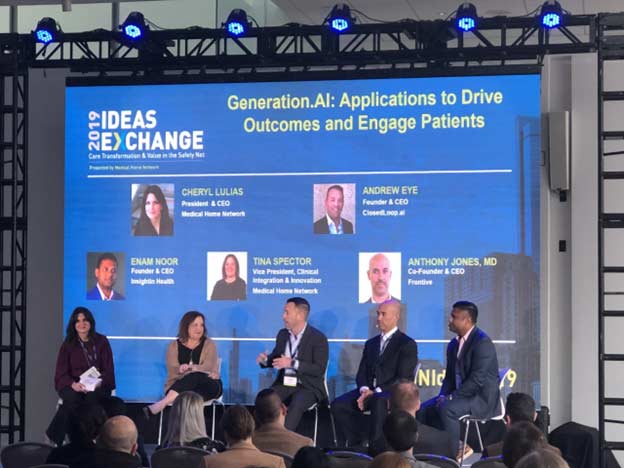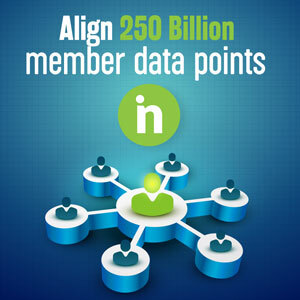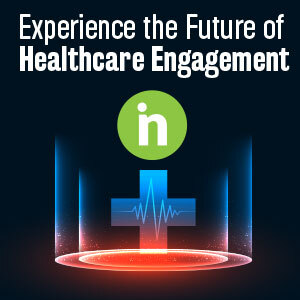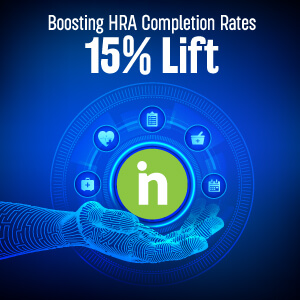Health Tech: Enam Noor On How Insightin Health’s Technology Can Make An Important Impact On Our Overall Wellness
Enam Noor interviewed by Authority Magazine on the impact of technology on wellness
In recent years, Big Tech has gotten a bad rep. But of course many tech companies are doing important work making monumental positive changes to society, health, and the environment. To highlight these, we started a new interview series about “Technology Making An Important Positive Social Impact”. We are interviewing leaders of tech companies who are creating or have created a tech product that is helping to make a positive change in people’s lives or the environment. As a part of this series, I had the pleasure of interviewing Enam Noor.
Enam Noor is the founder and CEO of Insightin Health. Enam has spent the last 20 years in marketing analytics and consumer engagement and the last decade in healthcare member engagement optimization. He was the founder of Desme, a cloud-based strategic marketing consultancy that utilizes big data and machine learning to provide Business Intelligence automation. The company was named Top 10 Search Engine Marketing Firms by INC. Magazine. Enam was the key strategist for a Gartner CRM Excellence Award for healthcare member engagement and was honored by DCA Live as an Entrepreneur to Watch in 2018 for DC’s tech community.
Thank you so much for joining us in this interview series. Before we dive in, our readers would love to learn a bit more about you. Can you tell us a bit about your childhood backstory and how you grew up?
I was interested in computers from an early age and quickly realized that was what I wanted to do with my life. My father was an engineer, my mother had an advanced degree, and my sister became a doctor, but I knew my path was computing. While my friends were playing computer games, I was teaching myself code. I knew I wanted to build something. That was at a time when coding was true coding. You had to develop an incredible amount of code just to produce a single webpage. When I got to Illinois Tech as a computer science major, an adviser suggested that adding a minor in psychology would help me understand human nature and gain valuable insight into the user experience, now known as UX. She was right; that psych minor has been invaluable.
Can you share the most interesting story that happened to you since you began your career?
My senior year in college I worked as a commodities buyer at a copper refinery which bought scrap metal and turned it into anodes. The business used antiquated Excel spreadsheets to predict prices and production. I built them an analytics tool that allowed them to anticipate the market demand and plan their production more accurately. It took the guesswork out of what they were doing, completely changing how they operated and improving the outcomes. In many ways, it was a precursor to what we’re doing with Insightin Health and driving the Next Best Action workflows. When something impactful happens to you at an early age, you lean into it years later.
None of us are able to achieve success without some help along the way. Is there a particular person who you are grateful towards who helped get you to where you are? Can you share a story about that?
That would be my father. He taught me that you don’t give up. You grind away, and eventually, you will find success. He also taught me that when you get too greedy, you can easily lose sight of what success is. He was a humble man, even though he was an incredibly talented engineer. His philosophies — and the way he lived his life — really stuck with me.
Can you please give us your favorite “Life Lesson Quote”? Can you share how that was relevant to you in your life?
A former colleague told me to start every day by finishing what you didn’t get done the day before. That’s simple, but it underlies an organizational philosophy I follow which is to get things done when they need to be done. Don’t get distracted by new ventures until the task at hand is complete and always follow a project roadmap.
You are a successful business leader. Which three character traits do you think were most instrumental to your success? Can you please share a story or example for each?
The first is striving for excellence in all things. Why do the ordinary when you can do the extraordinary? The key thing to remember is that the extraordinary can be achieved in many ways, and that doesn’t mean you have to be the CEO of a company. You can achieve what is important to you. The second is that — and this applies professionally and personally — don’t spend what you can’t afford. You must build a business before you go out and raise money — you must have customers and products. Today there are so many pre-product companies that exist when they are just an idea. Lastly, remember that no one is solely responsible for their own success. Success also comes from the people around you — talented teammates and the customers who are buying your products. They are essential to your success.

Ok super. Let’s now shift to the main part of our discussion about the tech tools that you are helping to create that can make a positive impact on our wellness. To begin, which particular problems are you aiming to solve?
Healthcare is incredibly complex, and most people lack the health literacy to know why they have the health problems they do or how to address them most effectively. That can lead to poor decision making that could worsen their health. Our aim is to make the healthcare industry more consumer-focused and give members the autonomy to make informed decisions and stay engaged in their health journey. It’s about being healthier by identifying or predicting potential gaps in care and resolving them with Next Best Action workflows. That starts with improving the customer experience and achieving better health literacy and transparency across the industry.
How do you think your technology can address this?
Insightin Health counteracts health illiteracy and its harmful consequences by providing health plans with simple, helpful guidance and interactions that make it easier for consumers to take the Next Best Action toward better health. It’s about understanding that there are real people behind the data. Putting the consumer at the center of everything means better results for everyone — as well as improved patient satisfaction.
Can you tell us the backstory about what inspired you to originally feel passionate about this cause?
Coming to the U.S., it was apparent that the healthcare system is siloed and hard to navigate compared to other countries — from scheduling an appointment to obtaining a prescription to communicating with insurance providers to sharing vital patient information at the point of care. For all the innovation in healthcare, full interoperability and data standardization was, and to some extent still is, rather elusive and lacking a consumer-centric focus. And in today’s data-driven world, people have come to expect highly personalized experiences. Retailers like Amazon and Apple have raised the bar on consumer expectations and today, nearly every industry is focused on offering their customers choice, flexibility, and speed.
I’ve always been passionate about building technologies to solve problems. I wanted to leverage my experience in the healthcare system to build a platform that could mirror the convenience and personalization popularized by retailers. It’s no longer acceptable to take weeks for a patient to get a provider referral or months to close a medical claim. Improving customer experience has been a health plan objective for years now, but progress has been fragmented and slow. Efforts to enhance member experience often fall short because health plans frequently take a generalized, one-size-fits-all approach to addressing key issues. It was time for healthcare to look at customer experience with urgency in the same way as retailers, and I wanted to help bring that to the industry.
How do you think this might change the world?
As I see it, Insightin Health will help drive a major shift in the healthcare industry: the prioritization of delivering highly satisfying consumer-centric experiences. Right now, healthcare lags far behind other industries. It needs to be modernized and streamlined to improve the consumer experience. Healthcare is so regulated, so complicated, and so slow. By contrast, you can get a mortgage in 90 seconds because the financial industry, another heavily regulated industry, has untangled a lot of its bottlenecks. Data needs to move faster in healthcare. It won’t happen overnight, but it needs to happen, and we have the technology to solve that problem.
Keeping “Black Mirror” and the “Law of Unintended Consequences” in mind, can you see any potential drawbacks about this technology that people should think more deeply about?
Buyers of healthcare technology are often too motivated by financial outcomes that they lose sight of the underlying reasons for purchasing the technology in the first place. The primary goal is to streamline processes to improve the member experience and help people lead healthier lives. The business model for most health plans today is built around claims processing and risk management, and understandably their technology purchasing decisions often align with those implications in mind. But as healthcare transformation continues, health plans should consider their role in the stewardship of their members’ wellbeing and invest in technologies that offer deeper insights into improving member experiences and outcomes in addition to operational and financial efficiencies.
Here is the main question for our discussion. Based on your experience and success, can you please share “Five things you need to know to successfully create technology that can make a positive social impact”? (Please share a story or an example, for each.)
- All technology companies should be created with the best interest of the consumer in mind and putting their experience at the center. Knowing who the ultimate beneficiary of your technology is and keeping their needs at the forefront of your operations will keep your core values in alignment. Much of my time in the early years of launching our platform was spent trying to best understand the needs of our end users and how we could best address them. My interactions with them helped me build a better understanding of the challenges they faced, and to this day that feedback helps drive us forward as a company and improve our offerings.
- The simpler the technology, the more likely it will be useful to others. The best technology, wherever possible, avoids complexity to help guarantee the greatest potential for user acceptance and interaction. That’s not to say complexity shouldn’t exist. It’s important not to make technology so simple that it compromises functionality. I’ve found in my experience that people who tend to lead busy lives will quickly abandon technology that has an overly complex design. People will accept a little complexity; however, most people are less interested in the clever the design of something. They care most about whether it enhances experience or improves convenience, and that should be the guiding light.
- Remain focused on the central mission and long-term goals of your technology. Think about how it will perform long-term rather than focusing on short-term gains. It’s important that you continue to enhance your technology in alignment with the ever-changing needs of your customers and new problems that arise in the marketplace. Change is inevitable, and your technology should evolve accordingly.
- Think about how you can apply the platform in other verticals, like how Uber expanded into Uber Eats. It utilized its platform to empower consumers to act. Applying this platform thinking to other vertical markets can enhance your ability to offer flexibility and consumable services while providing more value to customers that can often transform their businesses and their lives.
- Conventional wisdom says digital platforms should scale quickly, but that can sometimes be a mistake. Building a technology platform can provide plenty of opportunity for scaling innovation, but if you forget about what’s under the hood, you won’t scale effectively; you’ll just keep building while losing sight of your initial goals. In some industries, like healthcare, regulatory risk and complexity can often dictate scaling decisions, so a more thoughtful, incremental approach is more beneficial.
If you could tell other young people one thing about why they should consider making a positive impact on our environment or society, like you, what would you tell them?
It may sound cliché, but always treat people the way you want to be treated. Whether it’s your colleagues, your teammates, or supervisors, you can’t do it alone. The same holds true for healthcare. Ultimately it takes a collective effort — across all stakeholders — to improve experiences and the health of all members. Technology alone won’t improve healthcare, but it can help redefine the boundaries for how we make a lasting impact on the wellbeing of populations and achieve true transformation.
Is there a person in the world, or in the US with whom you would like to have a private breakfast or lunch, and why? He or she might just see this, especially if we tag them.
My answers have changed over the years. Earlier, it would have been Steve Jobs and before him, Bill Gates. Now I’d say Elon Musk, who I think is a genius. Not just because of the technology he has built but for the way he views the world. You can see a pattern with all three people. They’re all disruptors and they’re visionaries who could see how technology can improve the world.
How can our readers further follow your work online?
Readers can learn about all the important things going on with Insightin Health and our inGAGE platform by visiting our website at insightinhealth.com. People can also follow us on Twitter, LinkedIn, and Facebook.
Thank you so much for joining us. This was very inspirational, and we wish you continued success in your important work.




Leave a Reply